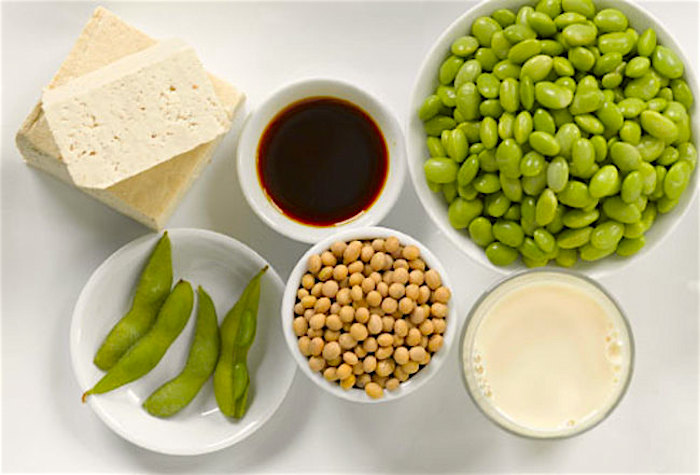 Eating foods that contain isoflavones can result in a 21% decline in all-cause mortality in women with hormone-receptor-negative breast cancer found a new study published in the journal Cancer. Isoflavones are estrogen-like substances found in soy.
Eating foods that contain isoflavones can result in a 21% decline in all-cause mortality in women with hormone-receptor-negative breast cancer found a new study published in the journal Cancer. Isoflavones are estrogen-like substances found in soy.
Researchers from Tufts University studied data from 6,235 American and Canadian women involved in the Breast Cancer Family Registry, a program funded by the National Cancer Institute that has collected clinical and questionnaire information about enrolled participants and their families since 1995. The researchers wanted to find out how eating lots of soy foods or drinking soy beverages after cancer diagnosis would affect the women’s risk of death.
The study authors divided the women into four groups based on data gathered from self-reported food frequency questionnaires, which estimated the amount of isoflavones eaten. The scientists followed the subjects for a median of 9.4 years.
Women who consumed the most soy were 21 percent less likely to die of any cause compared to those who consumed the least.
This link between isoflavone intake and reduced risk of death was strongest in women who had tumors without estrogen and progesterone receptors. The association was weaker but still significant in women who did not receive endocrine therapy such as the drug tamoxifen. Women with hormone-receptor-positive tumors or who did not receive endocrine therapy did not enjoy any benefits from soy.
Breast cancer is classified as either estrogen-receptor positive, progesterone-receptor positive, or hormone-receptor-negative. Hormone-receptor-negative breast cancer is a more aggressive type of the disease.
“At the population level, we see an association between isoflavone consumption and reduced risk of death in certain groups of women with breast cancer,” said lead researcher Fang Fang Zhang, M.D., Ph.D., from the Friedman School of Nutrition Science and Policy at Tufts University.
“Our results suggest, in specific circumstances, there may be a potential benefit to eating more soy foods as part of an overall healthy diet and lifestyle. Since we only examined naturally occurring dietary isoflavone, we do not know the effect of isoflavone from supplements. We recommend that readers keep in mind that soy foods can potentially have an impact, but only as a component of an overall healthy diet.”
The study considered a high intake of isoflavones to be 1.5 milligrams or more per day – what amounts to a few dried soybeans – but the researchers pointed out that people tend to underestimate the amount they’ve eaten when completing questionnaires.
“The comparisons between high and low consumption in our study are valid, but our findings should not be interpreted as a prescription,” said lead researcher Fang Fang Zhang, M.D., Ph.D., from the Friedman School of Nutrition Science and Policy at Tufts University. “However, based on our results, we do not see a detrimental effect of soy intake among women who were treated with endocrine therapy, which has been hypothesized to be a concern. Especially for women with hormone-receptor-negative breast cancer, soy food products may potentially have a beneficial effect and increase survival.”
Previous research supports the findings in this current study. Cell culture experiments showed that isoflavones slowed the growth of breast cancer cells. Epidemiological studies in East Asian women with breast cancer found that higher isoflavone intake was associated with lower mortality. However, there’s also some evidence that because isoflavones are estrogen mimics they may interfere with the effectiveness of endocrine breast cancer therapies. Because of this, the jury is still out on whether breast cancer patients should consume or avoid isoflavones, especially if they are taking drugs like tamoxifen.
In the current study, the possibility remains that the reason why the isoflavones had beneficial effects was not related to the isoflavones themselves, but rather to the women’s lifestyles. Dietary isoflavone intake was associated with socioeconomic and lifestyle factors that are involved in lowering mortality. Specifically, women who consumed the most dietary isoflavones were more likely to be Asian Americans, young, physically active, more educated, normal weight, non-smokers, and drink no alcohol. A strength of this study was the large size and diverse racial/ethnic makeup of the Breast Cancer Family Registry, which allowed the researchers to investigate mortality risk across different subtypes of breast cancer and subgroups of patients. It also allowed them to adjust for the aforementioned confounding factors. However, the scientists could not rule out completely the possibility that lifestyle factors may be involved in isoflavone’s benefits.
Source: Fang Fang Zhang, Danielle E. Haslam, Mary Beth Terry, Julia A. Knight, Irene L. Andrulis, Mary B. Daly, Saundra S. Buys, Esther M. John. Dietary isoflavone intake and all-cause mortality in breast cancer survivors: The Breast Cancer Family Registry. Cancer. 2017;DOI: 10.1002/cncr.30615











